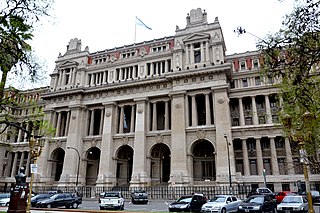
The politics of Bolivia takes place in a framework of a presidential representative democratic republic,whereby the president is head of state,head of government and head of a diverse multi-party system. Executive power is exercised by the government. Legislative power is vested in both the government and the two chambers of parliament. Both the Judiciary and the electoral branch are independent of the executive and the legislature. After the 2014 election,53.1% of the seats in national parliament were held by women,a higher proportion of women than that of the population.

The Supreme Court of Justice of the Nation (Spanish:Suprema Corte de Justicia de la Nación is the Mexican institution serving as the country's federal high court and the spearhead organisation for the judiciary of the Mexican Federal Government. It consists of eleven magistrates,known as ministers of the court,one of whom is designated the court's president.

The Supreme Court of Argentina,officially known as the Supreme Court of Justice of the Argentine Nation,is the highest court of law of the Argentine Republic. It was inaugurated on 15 January 1863. However,during much of the 20th century,the Court and the Argentine judicial system in general,has lacked autonomy from the executive power. The Court has been reformed in 2003 by the decree 222/03.

The Cabinet of Ministers of Venezuela (Spanish:Gabinete de Ministros de Venezuela is one of the bodies that make up the Venezuelan executive in that country's presidential system,alongside the Council of Ministers. The Cabinet is headed by the President of Venezuela,and his corresponding Vice President. The purpose of the ministries is to create,adopt,follow and evaluate policies,strategies,programs and projects in accordance with the constitution and the laws of the Republic.

Ricardo Luis Lorenzetti is an Argentine judge graduated from the National University of the Littoral,Argentina,with a long national and international career. He used to be Chief Justice of the Supreme Court of Argentina (2007-2018),proposed by President Néstor Kirchner and approved by the Senate,assuming his position on December 12,2004,covering the vacancy caused by the resignation of Justice Adolfo Vázquez. On November 7,2006,he was appointed Chief Justice,officiated as of January 1,2007. Currently,he is one of the five Justices of the Supreme Court. He was President of the Commission for the preparation of the Parliamentary Act to reform,update and unify the Civil and Commercial Codes of the Argentine Nation,Presidential Decree 191/2011.
The Supreme Court of Bolivia was the Bolivia's highest court from 1825 to 2012. It was located in Sucre,410 kilometres to the south-east of La Paz,Bolivia's capital. The Court was created by the Supreme Decree of April 27,1825,which transformed the Royal Audience of Charcas of imperial Spain into the Supreme Court of the newly independent country. The Supreme Court of Bolivia was officially inaugurated on July 16,1827.

Enrique Santiago Petracchi was an Argentine lawyer,judge and a member of Supreme Court of Argentina.

Carlos Enrique Rodado Noriega is a Colombian engineer and politician currently serving as Ambassador of Colombia to Argentina. He served as the 28th and 9th Minister of Mines and Energy of Colombia,first in the administration of President Julio César Turbay Ayala and again in the administration of President Juan Manuel Santos Calderón. Rodado,a civil engineer and economist,has also served as Ambassador of Colombia to Spain,President of Ecopetrol,Member of the Chamber of Representatives of Colombia,and as the 58th Governor of Atlántico.
The Supreme Court of Justice is the highest court of ordinary jurisdiction in Bolivia,based in Sucre. Its powers are set out in Articles 181–185 of the 2009 Constitution and the Law of the Judicial Organ. It was first seated on 2 January 2012.

Political Evolution,also known in Spanish by its shorthand Evópoli,is a Chilean centre-right political party,founded in 2012. The party defines itself as a liberal platform for the people who look for a "modern centre-right who proposes as the central axis of their proposal the appreciation of diversity,the emphasis on encouraging local communities and the pursuit of social justice".
Augusto Ibáñez Guzmán was a Colombian lawyer and academic. He was the President of the Supreme Court of Justice of Colombia from 2009–2012.
JoséLuis BarcelóCamacho is a Colombian lawyer and academic,former president of the Supreme Court of Justice of Colombia.
Same-sex marriage is legal in the Mexican state of Aguascalientes. On 2 April 2019,the Supreme Court of Justice of the Nation ruled that articles of the state's Civil Code that banned same-sex marriages violated Articles 1 and 4 of the Constitution of Mexico. The ruling came into effect upon publication in the Official Gazette of the Federation on 16 August 2019.
Gloria Ana Chevesich Ruiz is a Chilean lawyer and judge. She is currently a minister of the Supreme Court of Chile,and previously served as president and minister of the Court of Appeals of Santiago.

Sebastián Iglesias Sichel Ramírez is a Chilean lawyer,professor,ex minister of State and politician who served as president of the Banco del Estado de Chile from June 2020 until December 2020. He also previously served as Minister of Social Development and Family and executive vice president of Corfo under the second government of Sebastián Piñera. He was an independent candidate in the 2021 Chilean presidential election who ran under the centre-right Chile Podemos Más coalition.
Carlos Melchor Díaz Villavicencio is a Bolivian economist,professor,and politician who served as the Minister of Development Planning from 2019 to 2020 during the interim government of Jeanine Áñez. He previously served as Minister of Economic Development from 2005 to 2006 during interim government Eduardo Rodriguez Veltzé. As such,he has the distinction as being present in the cabinets of two interim transitional governments.

Mario Guillermo Desbordes Jiménez is a Chilean politician and former police officer of Carabineros de Chile. He became minister of Defense in July 2020.

Pedro Pierry Arrau is a Chilean lawyer who was a member of the Supreme Court of Chile. In his country,he was known for his conflicts of interest in the approval of the HidroAysén megaproject.











